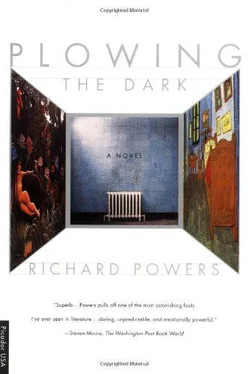Spiegel watched Adie walk across the translated boards. Where her feet trod on the illusion, Magritte-like, they occluded it. Jackdaw attended on her every hand-drawn desire. Spiegel put the postadoles-cent somewhere in his early twenties: two or three years older than Steve had been when he met the woman. Back at the beginning of creation, everyone was twenty.
Whatever made Adie choose the University of Wisconsin, Spiegel had long ago forgotten. He barely remembered his own reason for going to college in what Life magazine called "America's best place to live." What he remembered most about Madison was the cold. The town's average daily temperature hovered around 19 degrees. He'd followed a high-school sweetheart there, a woman whom he hoped to marry. They lost one another to multiple discoveries halfway through their first semester. So life always liked to run the little shill: the immortal cause vanishes, but the short-term effects last forever.
Stevie attended school on the Spiegel Memorial Scholarship, the family nest egg scraped together over two decades of middle-class scrimping. His parents meant the investment to give him a leg up in the practical world: fraternity membership, good connections, and a degree in civil engineering. Thirty credits into the process, little Stevie managed to sabotage all that, and more.
Madison was still reeling from its fatal bombing of the year before. The Army Math Research Center in Sterling Hall, "think tank of American militarism," had been gutted by campus radicals in the single most destructive act of sabotage in American history. The air on Lathrop Drive was still electric. A brilliant young low-temperature physicist lay dead, and a major national university stood teetering between revolution and revulsion, between We can do anything and What have we done?
Steve went back home to La Crosse that second Christmas, a semester's worth of dirty laundry in tow, and dropped his own bombshell on stunned parents. He'd found his real vocation. He couldn't, in good conscience, earn one more credit in engineering. He would study to become a poet. He stopped short of the phrase "true artificer," but it was in there, knocking around the back of his cerebellum.
This was the point in such stories when the father traditionally took the newly enlightened student prince out behind the woodshed and beat the living shit out of him. Maybe the Aged P was too incredulous to deliver the beating, as he should have. Maybe, in the wake of the Army Math bombing, his father's own sickened convictions had simply dissolved. Maybe Stevie's raw exuberance carried him through. Whatever the cause, both parents simply went ashen and wished him well, writing him off to a career as a greeter at some terminal superstore up on the periphery of north suburban Kotzebue.
Some residual shred of sanity prevented Steve from telling his parents the reason for his conversion. It had come in Introduction to English Literature, a Cakewalk survey course he took to satisfy his general education requirements. The teacher — in retrospect, probably only a hapless grad student caught up in the academic pyramiding scheme, awaiting his own superstore destiny — by way of lightening his class prep, had had each student recite and explicate a favorite poem.
And so in October of his twentieth year, Steve Spiegel sat in shock, listening to a shag-cut pug-faced girl across the room who had come to class tie-dyed on roller skates speak the words "Once out of nature I shall never take My bodily form from any natural thing."
The words, he supposed, were beautiful. The girl, he decided, was almost. But the way she said them: that was the warrant, the arrest, and the lifetime sentencing. Out of her mouth came a stream of discrete, miraculous gadgets — tiny but mobile creatures so intricately small that generations marveled and would go on marveling at how the inventor ever got the motors into them.
Once out of nature. The train of syllables struck the boy engineer as the most inconsolably bizarre thing that the universe had ever come up with. And this female mammal uttered the words as if they were so many fearsome, ornate Tinkertoys whose existence depended upon their having no discernible purpose under heaven. The words would not feed the speaker, nor clothe her, nor shelter her from the elements. They couldn't win her a mate, get her with child, defeat her enemies, or in any measurable way advance the cause of her survival here on earth. And yet they were among the most elaborate artifacts ever made. What was the point? How did evolution justify the colossal expenditure of energy? Once upon a time, rhythmic words might have cast some protecting spell. But that spell had broken long ago. And still the words issued from her mouth, mechanical birds mimicking living things. Sounds with meaning, but meaning to no end.
We'll put the door here, that girl's latest update said. Start it flush up against the back of the left-hand wall.
Spiegel and Jackdaw, her vaudeville apprentices, nodded in stereo.
We'II have to figure out what the floorboards actually look like, under the bed.
We can just reuse the piece we put in over there, Jackdaw said, all innocence.
No, no. That would be cheating. We have to follow the boards that he painted, and extend them. Work outward from the bits he could see.
Jackdaw groaned. But it's all going to be invisible in the finished product anyway.
Not to us, it isn't.
"But such a form as Grecian goldsmiths make." The girl's lips were a factory of ethereal phonemes. "Of hammered gold and gold enameling." Spiegel had never heard words pronounced that way — alloys of confusion and astonishment. Her mouth became the metal-worked machine its sounds described. Whole sentences of hammered gold tumbled out of it.
Stevie might have taken her for a drama student, except for the clotted paint under her nails. She finished reciting and launched into her explication, an associative ramble through the maze of images. She'd drawn a series of pen-and-watercolor sketches, visual aids to illustrate her points. Byzantium. A gyre. The mechanical bird, which looked to Stevie like an intricate, gold-leafed, cutaway, feathery Bulova.
This woman exuded a flavor he'd forgotten ever existed. She had the scent of immediacy, of planlessness. Existence was stranger than he'd ever realized. Every life held in its hands a bit of charcoal stick pressed from the ashes of the first campfire.
She must have felt his stare upon her as she gave her presentation. For when she brushed past him after the class let out, she asked, "That made absolutely no sense at all, did it?"
"You smell like something," he told her.
She laughed. "I'm sure you're right."
"No," he said. The breeze of association, the loose smell of free syllables played all around him. Pleasures too recently overlooked. Exercises out of the singing masters' book. "No. You smell like something my father used to keep in cans out in the garage. To clean paint brushes."
"That would be turpentine."
"Why are your fingers all green?"
She brought them up to her eyes. "It's not green. It's mostly chartreuse."
All he could do was nod.
"What do you do?" she quizzed him. Before any other data. Even before asking his name.
"Oh," he improvised, "I… write." He tipped his head to the side, toward the paperback Collected Yeats cradled in her chartreuse fingers. He tapped his own secondhand anthology, as if the volume were some hefty tab he'd run up at an all-night sidewalk cafe.
The bed should run from just inside that corner to right about here. The late-day Adie impersonator, her fingers now pristine, stood on an invisible X marking a spot on the Cavern floor that corresponded to points deep beneath the grid. She stood straight, arms at her side, turning her body into a surveyor's siting stick. Jackdaw, at the console, got a bead on her. He typed some words, and a reddish rectangular block sprang up along the wall's length, up to this woman's still-callow waist.
Читать дальше












